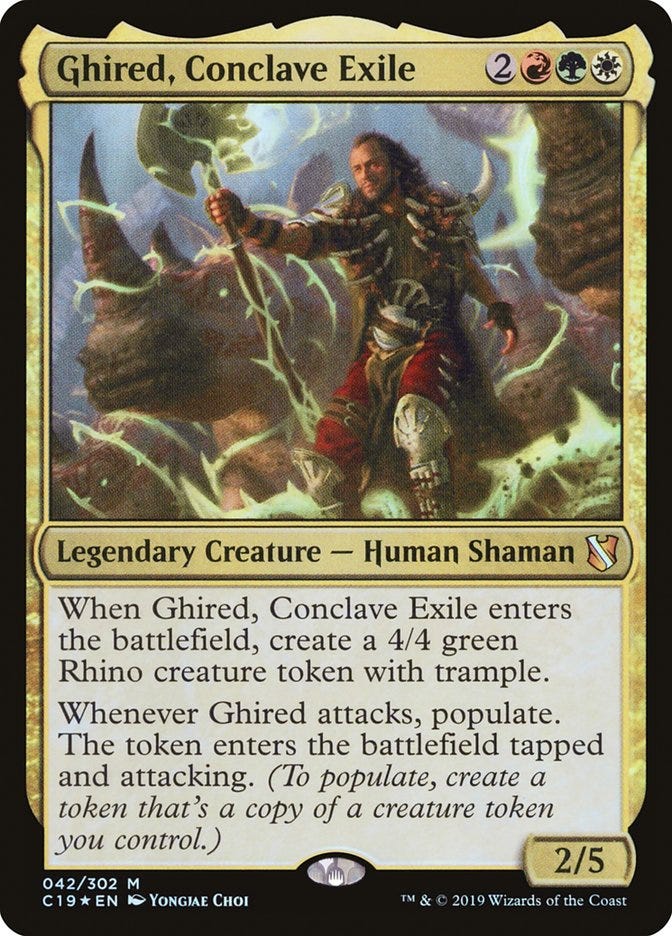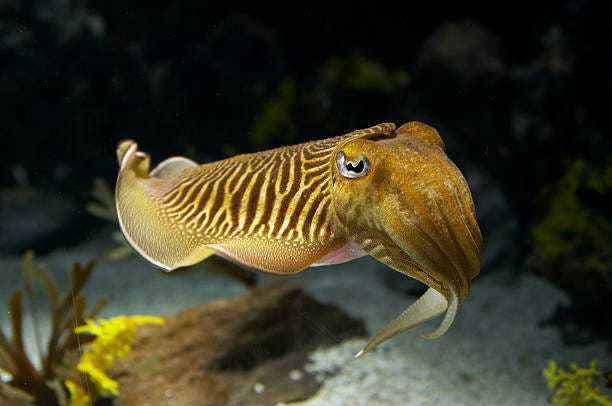Commander Darwinism
Can evolution teach us something about Commander and the health of the format?
The Origins of Species
Charles Darwin is famously known as the Father of Evolution. He, along with Alfred Russel Wallace, came up with the Theory of Evolution by Natural Selection. Many of us understand this theory in a short few words: Survival of the Fittest. The organisms that thrive in their environment will survive and pass on the traits needed for survival to their offspring. This is where the belief that we come from primates originates and that humans have adapted to survive for millions of years. Now evolution extends beyond biological theories to mean “a process of change in a certain direction.” A sports team can evolve from just playing sports together to becoming a band of brothers. Your personality can evolve when you start making small adjustments and make decisions on who you want to be! And just like evolution happens in different aspects of nature and life, your Commander deck can also evolve, change, and adapt depending on your playgroup, new sets coming out, or even your own Magic preferences. So today, I’d like to present my own Theory of Evolution of Commander, but not based on Natural Selection; my hypothesis is that the game of Commander as a format is evolving the same way that many personal Commander decks change over time. And while Survival of the Fittest might be important out in nature, I actually believe that Commander is at its best when it’s not following Darwin’s theory of evolution. To give this theory some context, let me explain how I began playing Commander and how my playstyle has evolved over the last several years.
Back in 2012, I was introduced to Magic by my best friend and his family, and he and his brothers had been playing since they were kids. They usually played Modern and so naturally that’s where I started as well; but seeing as how I had never played, I didn’t have any cards to play with and needed to purchase my first deck. I chose to build a Simic deck based on Vorel of the Hull Clade, playing a bunch of Evolve cards (funny, right?) focusing on +1/+1 counters. I chose to build a budget deck since I had never played Magic before and didn’t want to spend tons of money on something that I wasn’t sure if I would want to keep playing or not. I played for about a year, but I was constantly losing to my friend and his family since their decks were so much stronger and more expensive than mine, so I stopped playing for a little while. In 2014, I left on a two year church mission where I didn’t have many opportunities to play; but when I came back in 2016, my brother had really gotten into the game while I was gone so I decided to jump back in! I was still a little hesitant because I didn’t love the competitiveness of the game because I felt like I would have to pay to win. So rather than choosing to go back to Modern, my brother and I decided to get into Commander!
My first Commander deck was Omnath, Locus of the Roil, an Elemental Tribal deck designed on playing lots of lands and Elementals to gain value and secure the W. I built the deck for less than $100 for the same fear as before but found myself instantly loving Commander. I loved the social aspect of the format and that I could play spells I couldn’t normally play in more competitive formats. But after several months of playing Omnath and becoming invested in Commander, I felt like I wanted to start to win the games of Commander I was playing and play some stronger cards; I still loved Omnath but just didn’t feel like it could hold up against the rest of the table. So I started looking into stronger Commanders that could satisfy my playstyle and that’s when I stumbled into a little wizard named Jodah, Archmage Eternal. I packed the deck with big bombs that I could cast for a lot cheaper, spells like Zacama, Primal Calamity, Blatant Thievery, and my personal favorite, Aminatou’s Augury. I instantly became the archenemy of the table as I slung huge spells to dominate the board, get tons of value, and just be kind of ridiculous if I’m being honest. After a few months of running Jodah as my main commander, I decided to buy my first preconstructed deck where I discovered my truest love and my forever deck: Ghired, Conclave Exile.
Though Ghired started as a precon, I upgraded him rather quickly so he could hang with the rest of the table and not get beaten too badly. Over the next year or two, he went through a couple iterations, but really fell nicely into a strategy of efficiency: turns 1-2 were ramp, turn 3 would be getting a haste enabler or a card draw enchantment on board, turn 4 cast Ghired, and by turns 5-6 I was easily swinging for 20+ damage. Throw in an Akroma’s Will and I would be ending games by turn 7 even! But after that year or two, I realized something that would majorly change how I played Commander:
I actually didn’t care about winning that much anymore.
It wasn’t that I didn’t want my decks to perform, and I would be frustrated if I couldn’t win AT ALL, but I came to find that winning and winning as fast as possible wasn’t the most important thing anymore. My playstyle had evolved into prioritizing fun gameplay, cool combos of cards, and just having a good time playing Commander with my friends! So I took out ALL the early ramp in my deck (Yes, even Sol Ring!). I slowed my deck down, I removed extra combats and “easy” finishers like Akroma’s Will, and decided it was time to see how I wanted the deck to evolve. And I decided to turn Ghired into a Clone Deck, in Naya! I added cards like Delina, Wild Mage and Jaxis, the Troublemaker as ways to make copies of really fun creatures in my deck. I replaced extra combat creatures with ones that felt a bit more fun to me, like Archon of Valor’s Reach, Biogenic Ooze, or the card that I’m determined to win with one day, Angel of Destiny! I took out cards that were more “optimized” for cards that I felt played better for the table and weren’t as much of a “feel bad”. Now I understand that this way of thinking isn’t for everyone, but I immediately refell in love with the deck and it will be my forever deck. But it took the evolution happening for me to really continue to enjoy the deck because before I just kept tweaking it to be more optimized, to win better, faster, stronger (shoutout Daft Punk). It took me playing to win for a couple years to realize that I just wanted to build and see decks that just “did their thing” more than just super expensive decks that just always win. And interestingly enough, I believe that we’ve seen the same thing happen in the Commander community.
The early days of Commander (or Elder Dragon Highlander as it was then referred to) were people playing huge 7-8 drop dragons they couldn’t normally play in Standard or Modern. It was a lot of play what you own, throw stuff together and see if you can make it work; cast big dumb stuff and see what happens. My Omnath deck did something similar, where it was a little cheaper but it was just throwing some stuff together and seeing what it could do. As Commander blew up in popularity, the format started to get REALLY strong; you can see a lot of evidence in this by looking at some of the different content creators, like Game Knights. Starting around 2019 and going into 2020, known as the Year of Commander, a lot of the Commander games I would watch got stronger and stronger, faster and faster. It seemed that as the format grew in popularity, people wanted their decks to be as good as possible. Kinda like what I did with my own Jodah deck, interesting…. The format evolved from playing just big stuff and what you owned to adding Mana Crypts, Mana Vaults, the OG Dual Lands, etc. Just like Omnath grew into Jodah wanting to win and play stronger cards, over the last ten years Commander had now grown into caring about efficiency and playing the best cards and staples in the format. But I believe there is one more piece to this evolution which is where we currently find ourselves today.
Evolution Through Restraint
With Commander now being as mainstream as it is and the majority of Magic players in the format, we are now seeing the transition from the power playstyle to the more unique deckbuilding. Just as Ghired evolved from wanting to win to more of an off the wall clones style deck, Commander is slowing down a bit more. Players care more about the synergies in their deck and doing new and cool things rather than just winning every game they sit down to play at their local LGS. It used to be that you never wanted to play 3 mana value “rocks” (like Darksteel Ingot or Commander’s Sphere) and only ramp on turns 1-2 with Sol Ring or Signets and Talismans. Nowadays, I specifically look for ways to play on theme rocks that fit my deck more: Ghired plays Cursed Mirror, so I can get a “clone” for the turn that Cursed Mirror comes down. I play The Celestus in my Obeka, Brute Chronologist deck so I can put things into my graveyard occasionally. And we are seeing lots of players all over build their decks a bit more thematic. Check out players like Tomer from MTGGoldfish, or Ben Wheeler on LRRMTG, or even the writer from EDHREC Philomene Gatien. These are some of my favorite writers and players that have taken the game to a different level by not trying to play the “best” decks in the format. And since Commander has been popular for a while now, we are seeing these strategies being implemented throughout the community. The Command Zone, probably the biggest and most well known Commander content creators in the game, just brought on Rachel Weeks as one of their newest members; she consistently builds fun, unique decks that don’t just do the same thing as everyone else’s decks! This is the next step of the Evolution of Commander, and if you haven’t tried it, I highly recommend it!
Just like we’ve seen Commander evolve over the last decade, there are countless examples of animals that adapt and evolve to survive. There is a species of Alaskan wood frogs that freeze up to 60% of their bodies to be able to survive the harsh winters; they can even stop their heart beat and stop breathing, only to thaw out in the spring like nothing happened! There are kangaroo rats that live in the desert that can survive without even drinking water; they’re able to pull enough moisture from seeds they eat to get the nourishment they need. Cuttlefish have the amazing ability to camouflage with their surroundings to protect them from their predators’ hunt. With three skin layers of different colors and the papillae on their skin, which allows them to appear rigid like coral, they have evolved and truly applied the phrase “Survival of the Fittest.” Now while that might work great for species of animals in nature, I believe that the opposite is true for Commander! Sure, winning is great and all, but have you ever tried to kill the whole table in one swing with multiple copies of Angel of Destiny before? Or have you ever considered building a Landfall deck but without the color green? (Check out Quinton’s article on Out of the Box MTG for how!) Now having played Commander for quite a while, I have come to find that these are easily my favorite types of decks to play against and to build. And I think that that idea is spreading across the community! So give it a go! Let your Commander deck evolve; abandon Darwin’s idea of “Survival of the Fittest” and instead let your Commander decks lose a whole bunch. Eventually you will have that one game you’ll remember for the rest of your life because you pulled off a win with a whacky theme or style in unorthodox colors. Just like conservationists will implore people to “Save the Whales” or other endangered species, I implore each of you to “Save the Format” by evolving your Commander decks into not being the strongest deck at the table.








I enjoyed this article quite a bit, and this is what lead to the sub format I’ve written about - Humble Beginnings Commander. The problem is (to me) that it’s hard to evolve this way in a vacuum, you need support from others in your playgroup to do it (lest you feel like you don’t stand a chance).
This means you have to evolve in symbiotic relationship to other people and it can be hard when others care more about winning or do things that simply end the game when they happen and you end up not getting a chance to “do the thing.”